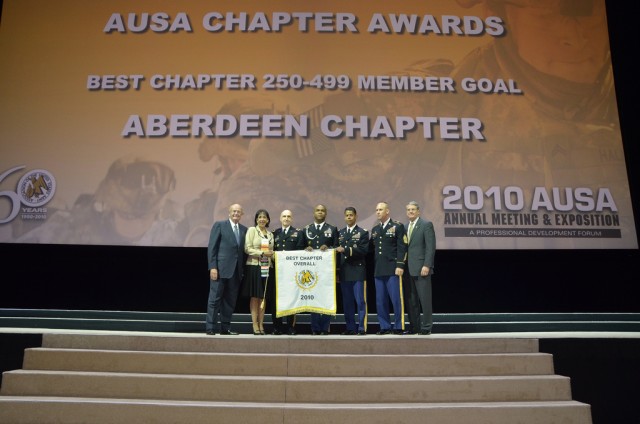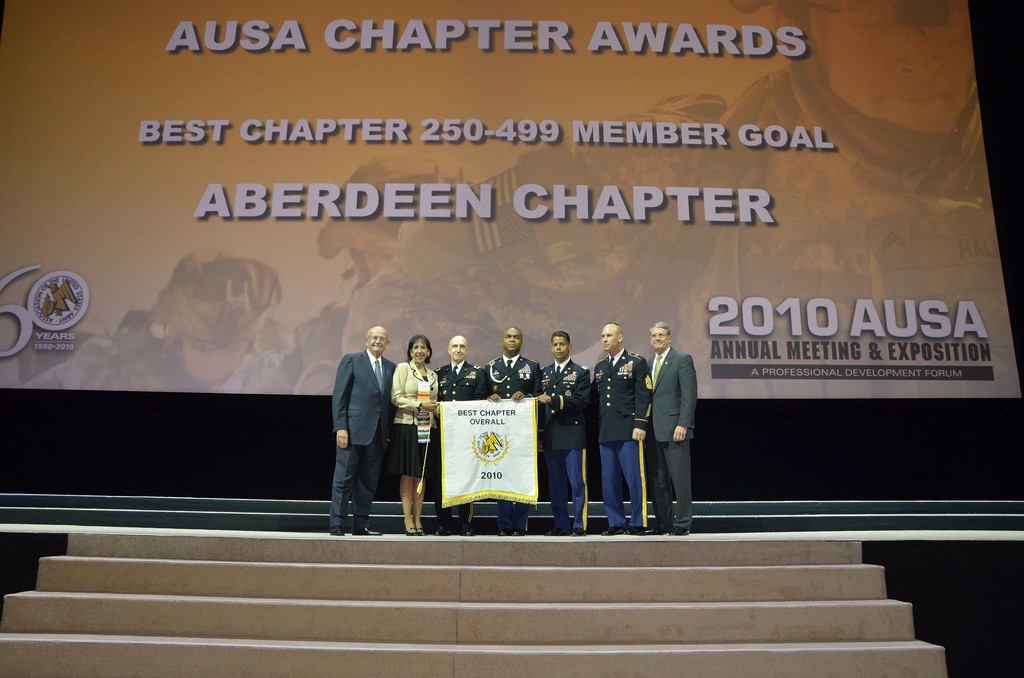In the scheme of the Association of the United States Army (AUSA) - a huge organization with worldwide reach - the Aberdeen, Md. branch is just a "little bitty chapter," its president likes to say.
But it's starting to be known as the little chapter that could.
In the past two years the Aberdeen chapter of AUSA has made major strides, expanding its membership, activities and fundraising in support of Soldiers. The AUSA national leadership has taken notice, recognizing Aberdeen with 18 awards in 2009 and 23 awards this October at its annual meeting in Washington, DC. The 23 awards, including Best Overall Chapter 2010, were the most received by any chapter - including bases several times the size of APG.
"No one had really heard of us before," said Mary Jane Jernigan, the chapter president. "We would have done the exact same things if there were no ribbons or awards ... (but) it gives Aberdeen Proving Ground a lot of spotlight."
That success has helped fuel even more ambitious goals, including a Wounded Warrior program that is the first of its kind in the country, and an expanded Soldier Santa Ball in Baltimore to fund care packages for deployed troops and their families, Jernigan said. With the influx of personnel from Fort Monmouth, N.J., the Aberdeen chapter is also working to attract more civilian members through diverse speakers, networking opportunities and continuous learning points (CLP) qualification for attending meetings and events.
"People want to help the Soldier, they just don't always know how, where or what to do," Jernigan said. "We are here for all of APG."
Senior leaders on post are among the chapter's monthly speakers - and its biggest advocates.
"A strong chapter here in Aberdeen benefits us all," said Brig. Gen. N. Lee S. Price, Program Executive Officer for Command, Control and Communications - Tactical (PEO C3T), one of the organizations in the midst of its move to APG. "The chapter's growth is a tribute to the dedication of its leaders and members to supporting Soldiers and those who support them."
Membership in AUSA is more affordable than many other professional groups, Jernigan said. Just $33 per year buys a monthly magazine and newsletter from the national organization, known as the "Voice for the Soldier, Support for the Families" and "AUSA - your voice on the Hill." Reduced rates are available for junior Soldiers, and corporate memberships cost $150 annually, she said.
When Jernigan began her role as president in 2008, the chapter had about 300 members, most from the Ordnance Center and School that has relocated to Fort Lee, Va. as part of the Base Realignment and Closure (BRAC) process. There were no monthly meetings.
"My challenge was, number one, to get the message out to the community that AUSA is here and that we're a viable organization at APG, not just national," said Jernigan, a URS contractor supporting the Army. Her father served in Japan during World War II. "What we had with this chapter ramping up was we could be whatever we wanted to be - and we wanted to establish strong Army flavor."
That took the form of lively meetings - including a lunch when members "cooked" and ate Meals Ready to Eat (MREs) - and high-profile guest speakers, such as (Ret.) Gen. Benjamin S. Griffin, then the Commanding General of the U.S. Army Materiel Command. Each meeting includes a detailed printed program that helps educate the audience about a different aspect of the Army or APG.
"The APG leadership has been an integral part of our success. Without their support of our mission, we could not have accomplished our goals," Jernigan said.
Interest blossomed to more than 500 members, including six general officers, and 34 corporations. The awards and recognition began to pile up, but the chapter did not lose sight of its core mission. When a deployed Soldier's home on base was destroyed by fire, the Aberdeen chapter raised $15,000 for his family from sources as far away as Florida, Jernigan said.
"If you ever doubt the fact that people want to help, all you have to do is look at that," she said.
The chapter's newest effort, the Wounded Warrior program, aims to help Soldiers transition back to civilian life by transferring them to APG prior to their medical discharge. While working for an organization on post, they also receive job training skills such as mock interviews and resume writing, Jernigan said. Local colleges will also help provide education and retraining for those who relocate to the area post-military, said (Ret.) Maj. Richard Moyers, who conducts outreach to wounded service members on behalf of the Army Research Laboratory (ARL) and is leading the new Wounded Warrior program.
"If they want to work with the government, we'll seek ways to get them fit for the right job," he said. "If they want to work with contractors in support of the government, we'll help to build worthwhile resumes and fit them into such a community. If they want to start an entrepreneurship, we'll set them up with a coaching service to still serve our nation by increasing our GDP," Moyers said. "Our major focus will be to try to avoid going a mile wide, but only an inch deep. Rather, we'd like to go a couple of inches wide, but a mile deep into helping some of our Wounded Warriors out."
For example, a recent golf scramble raised $25,000 to support Wounded Warrior Programs.
"This little bitty chapter has a tournament," Jernigan said. "That's pretty awesome."


Social Sharing